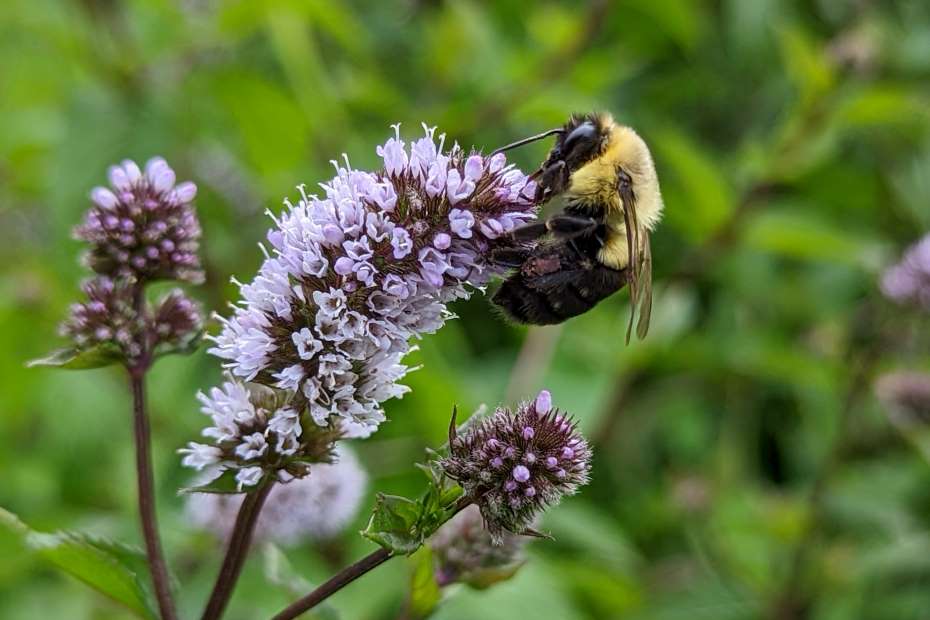
Organic is Livelier
Organic growing methods create a healthy environment. Plant species, birds, insects, and underground life are all more plentiful and diverse on organic farms. And that same biodiversity helps organic farmers sustainably manage crop pests including insects, weeds and disease.
The rapid loss of species worldwide has been called the 6th extinction crisis and agriculture is one of the greatest contributors. Organic farming practices like intercropping and maintaining natural areas around crop fields, and the fact that synthetic pesticides like glyphosate and neonicotinoids are not used, increase biodiversity and provide habitat for species at risk. In a review of 98 studies, researchers found that organically managed farms had an average of 95% more plant species, 35% more bird species, and 22% more insect species. They also found a 55% increase in the abundance of spiders!
Life underground is also thriving. With all the biodiversity above ground coupled with the addition of biological materials like animal manure, plant matter and compost, soil organisms are well-fed and active. Hundreds of species of underground workers break down the biological materials into nutrients that plants can use. Their activities also keep the soil in good shape by binding soil particles together. A good soil structure means more water and nutrients stay in the soil, it’s easier for plant roots to grow and the soil is less likely to be damaged by wind or water erosion. Keeping the soil life well-fed and pesticide-free is how organic soil stays healthy and fertile.
If you are concerned about supporting biodiversity, you can feel good about choosing Organic: Food with Principles. Guaranteed.
Did You Know?
Scientists are eavesdropping on life underground.
 Soil ecologists have started listening to the sounds coming from under the ground. They’re finding that every organism has its own soundtrack from the short clicks of root-eating larvae to the rustle of worms moving through tunnels. Individual species even seem to have unique patterns of sound similar to the different bird songs among avian species. Scientists are also finding that life is much quieter under intensely farmed fields. As soil health is depleted, so is the abundance and diversity of the underground orchestra.
Soil ecologists have started listening to the sounds coming from under the ground. They’re finding that every organism has its own soundtrack from the short clicks of root-eating larvae to the rustle of worms moving through tunnels. Individual species even seem to have unique patterns of sound similar to the different bird songs among avian species. Scientists are also finding that life is much quieter under intensely farmed fields. As soil health is depleted, so is the abundance and diversity of the underground orchestra.
Did You Know?
Pollinating insects are on the decline.
 Pollinating insects are part of balanced ecosystems, not to mention that about one third of the world’s food supply comes from pollinated crops. Pesticides are one of the reasons pollinator numbers are shrinking. Neonicotinoid pesticides, for example, are particularly harmful to bees, disrupting their learning and memory and impairing reproduction both in the larvae and adult life stages. Bees are not the only pollinators; studies show that maintaining a diverse population of pollinators like birds, butterflies, moths, flies, beetles, wasps and bees increases the quality and quantity of crop yield and enhances pollination during times of environmental and climate stress. Biodiverse systems are more resilient.
Pollinating insects are part of balanced ecosystems, not to mention that about one third of the world’s food supply comes from pollinated crops. Pesticides are one of the reasons pollinator numbers are shrinking. Neonicotinoid pesticides, for example, are particularly harmful to bees, disrupting their learning and memory and impairing reproduction both in the larvae and adult life stages. Bees are not the only pollinators; studies show that maintaining a diverse population of pollinators like birds, butterflies, moths, flies, beetles, wasps and bees increases the quality and quantity of crop yield and enhances pollination during times of environmental and climate stress. Biodiverse systems are more resilient.